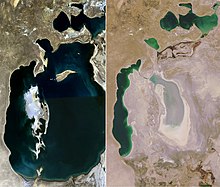
Back إدارة الموارد البيئية Arabic पर्यावरणी मैनेजमेंट Bihari পরিবেশগত সম্পদ ব্যবস্থাপনা Bengali/Bangla Umweltmanagement German Gestión ambiental Spanish Keskkonnajuhtimine Estonian مدیریت منبع زیستمحیطی Persian Ympäristöjohtaminen Finnish Management environnemental French Bainistíocht acmhainní an chomhshaoil Irish

Environmental resource management or environmental management is the management of the interaction and impact of human societies on the environment. It is not, as the phrase might suggest, the management of the environment itself. Environmental resources management aims to ensure that ecosystem services are protected and maintained for future human generations, and also maintain ecosystem integrity through considering ethical, economic, and scientific (ecological) variables.[1] Environmental resource management tries to identify factors between meeting needs and protecting resources.[2] It is thus linked to environmental protection, resource management, sustainability, integrated landscape management, natural resource management, fisheries management, forest management, wildlife management, environmental management systems, and others.
- ^ Pahl-Wost, C. (May 2007). "The implications of complexity for integrated resource management". Environmental Modelling and Software. 22 (5): 561–9. CiteSeerX 10.1.1.196.1136. doi:10.1016/j.envsoft.2005.12.024.: 561
- ^ Uehara, Thiago Hector Kanashiro; Otero, Gabriela Gomes Prol; Martins, Euder Glendes Andrade; Philippi Jr, Arlindo; Mantovani, Waldir (June 2010). "Pesquisas em gestão ambiental: análise de sua evolução na Universidade de São Paulo". Ambiente & Sociedade. 13 (1): 165–185. doi:10.1590/s1414-753x2010000100011. ISSN 1414-753X.